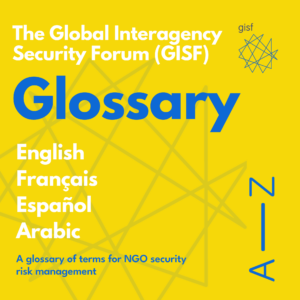GISF launches a glossary of terms to facilitate a common understanding of words and phrases frequently used in security risk management.
In security risk management, acronyms and technical terms are part of daily life. Having a common language enables us to be precise in our communications. But it only works if we all share the same understanding of what each word or phrase means.
 To help facilitate a common understanding of frequently used terms in security risk management, the Global Interagency Security Forum (GISF) has developed a glossary. It contains over 230 distinct terms and definitions. These were drawn from a range of trusted resources, including GISF’s own publications. They were also informed by a working group of GISF members.
To help facilitate a common understanding of frequently used terms in security risk management, the Global Interagency Security Forum (GISF) has developed a glossary. It contains over 230 distinct terms and definitions. These were drawn from a range of trusted resources, including GISF’s own publications. They were also informed by a working group of GISF members.
Now, the full glossary is available on GISF’s website. It has been designed to be as interactive as possible, enabling users to easily navigate to related terms and sources through direct links.
Most significantly, the glossary has also been translated into French, Spanish and Arabic. Every term in the glossary is linked to its equivalent in the other languages. This enables easy navigation between languages, which is vital to supporting more accurate communication over language barriers.
“In recent years, GISF has been stepping up its game in terms of translations,” said Christian Kriticos, GISF’s Communications Lead. “In 2024 alone, we have issued 13 translated products so far. This even includes some publications in Amharic and Ukrainian. But the glossary is probably our most significant translated resource. It will really help ensure greater consistency across language barriers.”
The glossary will soon be available as a printed version as well. “We thought this resource would make an excellent pocketbook for security staff to carry with them or keep at their desk,” Kriticos said. “That way, they can always look up a term of interest – whether they are in the office or on the move.”
The web version of the glossary will continue to be updated as the language of the sector evolves. There is a feedback form to enable this. So, if users believe a term is missing, or a definition could be strengthened, they can submit their comments easily.
“We would really implore everyone in the sector to interact with the glossary,” Kriticos concluded. “Read it, share it, and give us your feedback. We are especially keen to reach French, Spanish and Arabic-speaking networks. So, if you are connected to these groups, please do share the glossary. By doing so, you can help strengthen a common understanding of the language of the sector. And that will ensure more precise security risk management to keep aid workers safe.”